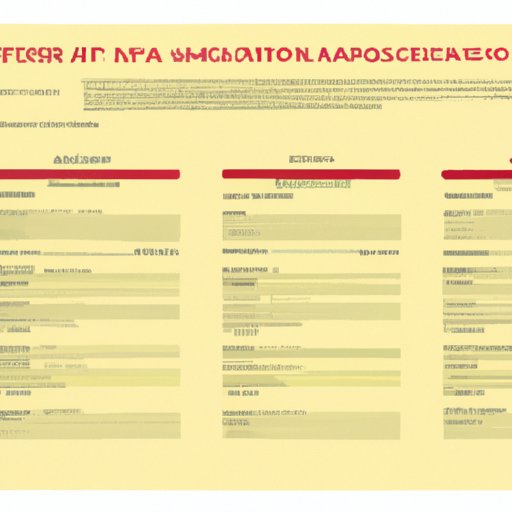Introduction
Financial advisors play an important role in helping people plan and manage their finances. They evaluate a person’s current financial situation and offer advice on how to best reach their goals. But what do financial advisors make a year? In this article, we’ll explore the salaries, bonuses, fees, and other benefits that financial advisors make in different industries and locations.
Interview a Financial Advisor to Find Out What They Make
One of the best ways to get an accurate picture of what financial advisors make is to talk to one directly. An experienced financial advisor should be able to provide you with a detailed breakdown of their income, including salary, bonuses, commissions, and other forms of compensation. Ask questions about the type of clients they work with, the services they offer, and the fees they charge.
Benefits of talking directly with a financial advisor include getting a better understanding of the job itself and gaining insight into the industry. You can also get advice on how to become a successful financial advisor and find out what qualifications and certifications are required.
Review Salaries of Financial Advisors in Different Industries
The salary of a financial advisor will vary depending on the industry. According to the Bureau of Labor Statistics, the median annual wage for personal financial advisors was $87,850 in May 2019. Financial advisors working in the securities and investments industry typically earn higher salaries than those working in other industries, such as banking or insurance.
Salaries also vary based on the size of the firm. Financial advisors who work for large firms tend to make more money than those who work for smaller firms. Additionally, performance-based bonuses and commissions can increase a financial advisor’s salary significantly.

Compare Salaries of Financial Advisors Across Different Locations
Regional differences in salaries can be significant. For example, financial advisors in New York City typically make more money than those in small towns. Location also affects the types of services financial advisors offer and the fees they charge.
Geographic factors that impact pay include cost of living, state taxes, availability of jobs, and competition. Financial advisors in areas with a high cost of living and high taxes may need to adjust their fees accordingly. It’s also important to consider the job market: if there are more financial advisors in the area, salaries may be lower due to increased competition.

Analyze the Impact of Experience and Education on Financial Advisor Salaries
Experience plays a major role in determining the salary of a financial advisor. Generally speaking, the more experience a financial advisor has, the more they will be paid. This is because experienced advisors have a better understanding of the markets, which allows them to give more comprehensive advice.
Education is also important. Financial advisors should have at least a Bachelor’s degree in finance, economics, or a related field. Some employers may also require additional certifications, such as the Certified Financial Planner (CFP) designation.
Examine the Relationship Between Fees and Financial Advisor Salaries
Financial advisors typically earn their income through fees and commissions. Most financial advisors charge a fee for their services, which can range from a flat rate to a percentage of assets managed. Commissions are usually earned when a financial advisor sells a product, such as a mutual fund or stock.
The pros and cons of fee-based vs commission-based pay depend on the individual. Some financial advisors prefer the security of a steady paycheck, while others like the potential for higher earnings with commissions. Ultimately, it’s up to each financial advisor to decide which type of compensation works best for them.

Explore Bonuses and Other Benefits Received by Financial Advisors
Bonuses are common among financial advisors, especially those who work for larger firms. Bonuses may be based on performance, such as meeting certain sales goals or hitting a certain number of client referrals. Other forms of compensation may include health insurance, retirement plans, and vacation time.
Financial advisors should take advantage of all the benefits they receive. If possible, they should try to maximize their earnings with bonuses, retirement contributions, and other forms of compensation.

Evaluate the Pros and Cons of Becoming a Financial Advisor
Becoming a financial advisor can be a rewarding career. Financial advisors have the opportunity to help people achieve their financial goals and make a good living. However, it isn’t for everyone. Financial advisors must be willing to put in long hours and deal with difficult clients. There is also the potential for high stress levels and unpredictable income.
Conclusion
In conclusion, financial advisors play an important role in helping people plan and manage their finances. The salary of a financial advisor can vary greatly depending on the industry, location, experience, and other factors. Financial advisors may also receive bonuses, commissions, and other benefits. Becoming a financial advisor can be a rewarding career, but it comes with its own set of challenges.
(Note: Is this article not meeting your expectations? Do you have knowledge or insights to share? Unlock new opportunities and expand your reach by joining our authors team. Click Registration to join us and share your expertise with our readers.)
